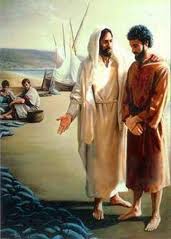Jesus and the Child in the Midst
Mark 9:33 - 37Jesus and his disciples came to a house in Capernaum. There he asked them, "What were you arguing about on the road? But they kept quiet. On the way, they had argued about who was the most important person.
Jesus sat down and called for the Twelve to come to him. Then he said, "If you want to be first, you must be the very last. You must be the servant of everyone."
Jesus took a little child and had the child stand among them. Then he took the child in his arms. He said to them, "Anyone who welcomes one of these little children in my name welcomes me. And anyone who welcomes me doesn't welcome only me but also the One who sent me.
(Kid's Devotional Bible; New International Reader's Version)
This verse is foundational to the child theology movement which invites us to view Jesus' words through the lens of a child in the midst. Here Jesus draws a child into the conversation to emphasize the goal of Jesus' followers is to serve, not to compete for the leadership role. But what does this passage say to a child?
John Ortberg, now pastor at Menlo Park Presbyterian Church, spoke to the children's ministry teachers and pastors at Willow Creek Community Church Promiseland Conference several years ago when he was still on staff there. He invited us to imagine Jesus, a man who conveyed such a persona of trust and love that children who didn't even know him felt comfortable sitting on his lap!
Children in Kid's Word brainstormed who Jesus is to them earlier today. They raised some critical messages: He's someone you don't need to see to believe in; He loves me and everybody. They named Jesus as protector, comforter, lover of their soul, hope for the future, sweet, soothing voice. A child once told me she would be able to recognize Jesus because she could tell from the love in his eyes.
This next weekend as we look at this verse, we are invited to come to know better Jesus' love for us. Here are some questions we'll explore.
Questions to Ponder with Children
* If Jesus were to walk into this room, how would you know it was Him? What characteristics of Jesus would help you know it was him? If you were to meet Jesus walking down the street or in your school, how would you know it was Him? What do adults do that make you feel comfortable, make you feel safe with them, make you trust them?
* When you were a little child, with what kinds of people were you comfortable sitting in their lap?
* What do you know about Jesus' love for you? What would you like to learn?
Questions to Ponder as Adults
* What are some memories of adults who made you feel safe? How did they act? In whose lap were you comfortable sitting?
* In what ways do we look at children as "less than" adults?
* How does Jesus see children? Does he view them as less than adults? If not, why not?
* How can we see children through Jesus' eyes? What would have to change about how we view children?
Activities We'll Do Next Sunday
* Use art materials to represent Jesus' love for us
* Use puppets and blocks to play out the scene from this Bible story
* Use dress-ups to play out the scene from this Bible story
* Write about Jesus' love for us in our Kids' Word Journals


